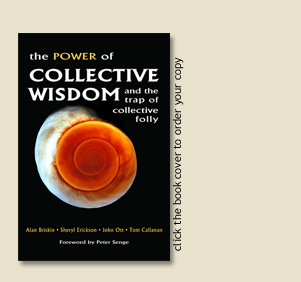Power Over vs Power With
Probably no idea is more essential to Follett’s thinking than her
distinction between power over and power with. Power over is a traditional
relationship in which one person has power over another person or
one group over another group or one nation over another nation. It
is a traditional relationship in the sense that dominance and coercion
are used time and again before other alternatives are sought. One
side vies for power over another, at best trying to influence the
other to concede its position, at worst using brute force to have
its way. Power over is a relationship of polarity, opposite views
and differentials in power forever attracting each other from a posture
of suspicion if not downright contempt.
Power with is at once relational
and collective. It creates new possibilities from the very differences
that might exist in a group. Unlike brute force, which must be continually
reinforced to sustain itself, power with emerges organically from
the participants involved and grows stronger the more it is put to
use. Power with is an organizational form of collaboration, an idea
central to what today is called stakeholder engagement, multisector
approaches, and cocreative power. Power with has the boldness to
believe that acting from immediate self-interest is not always the
wisest course of action, nor that one person or one group should
be in a position to know what is best for another. Follett believed
instead that reciprocal influence could lead to a creative synthesis.
What is remarkable about Follett’s approach is that she did not advance
power with as a utopian solution. Rather, she asked a far simpler
and subtler question: How could our dependence on relationships of
power over be diminished?
pdf of the full text |









